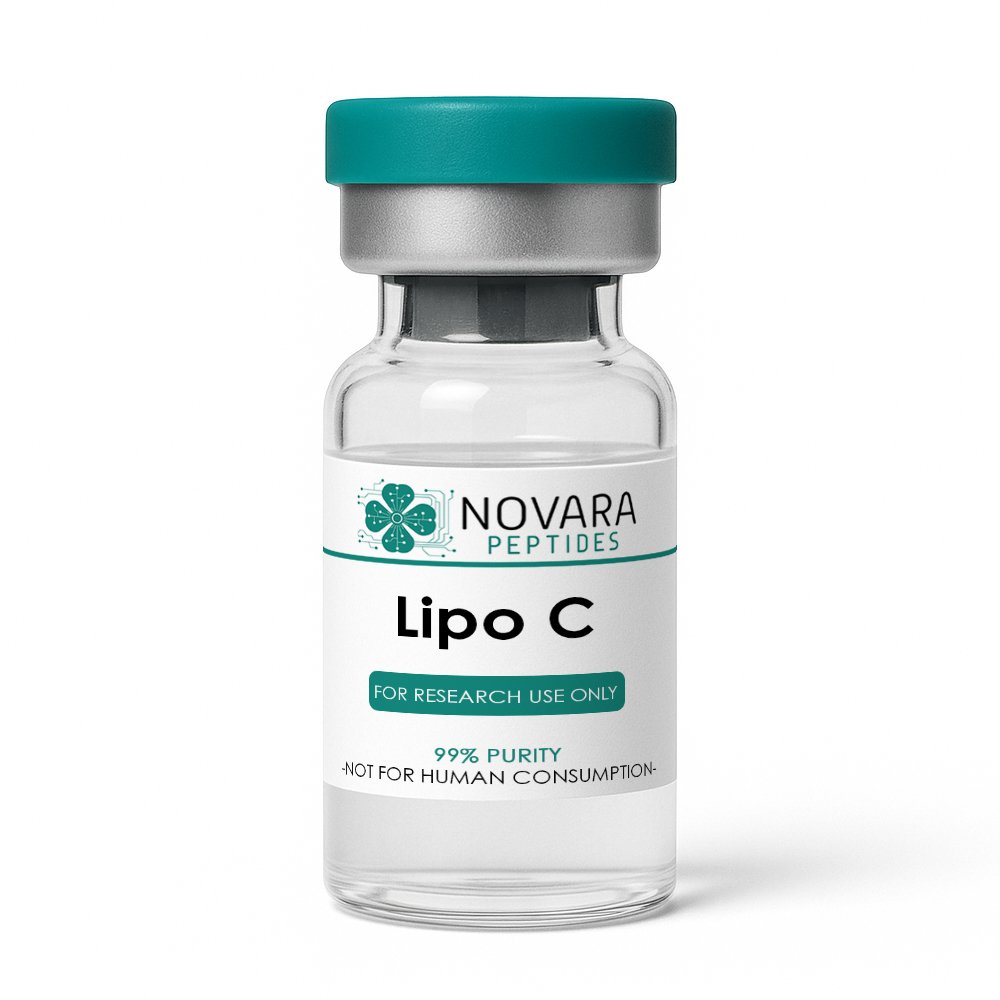| Compound Name | Lipo C (Lipotropic Compound Blend) |
| Active Ingredients | Methionine, Inositol, Choline, L-Carnitine |
| Total Active Content | 216 mg per vial |
| Chemical Class | Amino acid derivatives and lipotropic cofactors |
| Form | Liquid sterile solution |
| Appearance | Clear, colorless aqueous solution |
| Storage Conditions | Refrigerate (2–8 °C), protect from light |
| Intended Research Use | Metabolism, lipid transport, and liver function studies |
Lipo C – 120mg – 10ml
$ 69.00
All products are for laboratory research purposes only. Not for human consumption, medical, or veterinary use. Novara Peptides does not condone or support the use of peptides outside of controlled scientific research. By purchasing, you acknowledge that you are a qualified researcher or institution. You must be 21 or older.




Lipo C (216 mg)
Research-Grade Lipotropic Compound Blend
Tagline: Metabolic & Lipid Mobilization Research Formula
Product Description
Lipo C is a lipotropic compound blend composed of Methionine, Inositol, Choline, and L-Carnitine, designed for research into fat metabolism, hepatic function, and energy production. This synergistic combination supports studies on lipid oxidation, methylation pathways, and mitochondrial energy metabolism, making it an important formulation for metabolic research.
Researchers use Lipo C to investigate fat utilization, liver detoxification, and metabolic signaling pathways involved in lipid breakdown and energy regulation. The 216 mg concentration provides a standardized dose for consistent reproducibility in laboratory studies.
For Laboratory and Scientific Research Use Only. Not for Human Consumption.
Why Researchers Choose Lipo C
Multi-Pathway Lipid Metabolism: Combines amino acids and cofactors that support hepatic lipid processing.
Mitochondrial Energy Research: Contains L-Carnitine to promote fatty acid transport into mitochondria.
Liver Function Studies: Choline and Methionine support methylation and detoxification pathways.
Metabolic Regulation: Used in obesity, insulin sensitivity, and lipolysis model studies.
High-Quality Composition: Pharmaceutical-grade raw materials for precise reproducibility.
Important Note
For laboratory and scientific research only. Not for human consumption, therapeutic, or diagnostic use.
Research Applications
Lipid Metabolism & Fat Oxidation
Methionine, Choline, and Inositol act synergistically as lipotropic agents — enhancing the transport and metabolism of fats from the liver. Studies demonstrate that these compounds prevent hepatic lipid accumulation and promote fatty acid oxidation in hepatocytes [Zeisel 2006].
Mitochondrial Energy Production
L-Carnitine plays a critical role in transporting long-chain fatty acids into the mitochondrial matrix for β-oxidation, supporting ATP generation and metabolic efficiency [Rebouche 2004].
Liver Function & Detoxification Research
Choline and Methionine contribute methyl groups in S-adenosylmethionine (SAMe) synthesis, essential for liver detoxification and phospholipid biosynthesis [Mato 2002].
Insulin Sensitivity & Glucose Regulation
Preclinical models indicate that lipotropic blends improve glucose tolerance and insulin signaling, making them relevant for studies on metabolic syndrome and obesity [Pekala 2011].
References
Zeisel SH. (2006). Choline: critical role during fetal development and dietary requirements in adults. Annu Rev Nutr.
https://www.annualreviews.org/doi/10.1146/annurev.nutr.26.061505.111156Rebouche CJ. (2004). Kinetics, pharmacokinetics, and regulation of L-carnitine and acetyl-L-carnitine metabolism. Ann N Y Acad Sci.
https://pubmed.ncbi.nlm.nih.gov/15247010/Mato JM, et al. (2002). S-adenosylmethionine in liver health, injury, and disease: methylation and transsulfuration pathways. Am J Clin Nutr.
https://academic.oup.com/ajcn/article/76/5/1183S/4689627Pekala J, et al. (2011). Inositol and choline in lipid metabolism and insulin sensitivity. Nutrients.
https://www.mdpi.com/2072-6643/3/9/1003
Mechanism of Action (How Lipo C Works)
Lipotropic Function: Methionine, Inositol, and Choline promote lipid breakdown and transport in hepatic cells [Zeisel 2006].
Methylation Support: Enhances methyl-group transfer and SAMe production, critical for liver metabolism [Mato 2002].
Fatty Acid Transport: L-Carnitine enables movement of long-chain fatty acids into mitochondria for oxidation [Rebouche 2004].
Hepatoprotective Action: Reduces hepatic triglyceride accumulation and oxidative stress [Pekala 2011].
Energy Conversion: Supports mitochondrial ATP production and cellular metabolism [Rebouche 2004].
References
Zeisel SH. (2006). Choline: critical role during fetal development and dietary requirements in adults. Annu Rev Nutr.
https://www.annualreviews.org/doi/10.1146/annurev.nutr.26.061505.111156Rebouche CJ. (2004). Kinetics, pharmacokinetics, and regulation of L-carnitine and acetyl-L-carnitine metabolism. Ann N Y Acad Sci.
https://pubmed.ncbi.nlm.nih.gov/15247010/Mato JM, et al. (2002). S-adenosylmethionine in liver health, injury, and disease: methylation and transsulfuration pathways. Am J Clin Nutr.
https://academic.oup.com/ajcn/article/76/5/1183S/4689627Pekala J, et al. (2011). Inositol and choline in lipid metabolism and insulin sensitivity. Nutrients.
https://www.mdpi.com/2072-6643/3/9/1003
Related products
Ipamorelin
$ 35.00 – $ 49.00Price range: $ 35.00 through $ 49.00 Select options This product has multiple variants. The options may be chosen on the product pageGlutathione
$ 39.00 – $ 79.00Price range: $ 39.00 through $ 79.00 Select options This product has multiple variants. The options may be chosen on the product pageEpithalon
$ 35.00 – $ 119.00Price range: $ 35.00 through $ 119.00 Select options This product has multiple variants. The options may be chosen on the product pageCJC-1295 (No DAC)
$ 29.00 – $ 49.00Price range: $ 29.00 through $ 49.00 Select options This product has multiple variants. The options may be chosen on the product page






